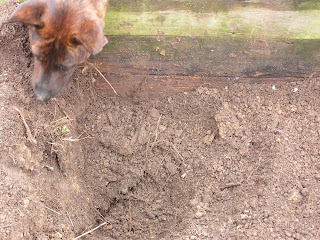Now the nettle Urtica dioica is a pretty amazing plant, It has a vast number of uses, it can be eaten (cooked of course), you can use it as a vegetarian rennet, you can make a yellow dye from the roots and a green food colouring from the leaves, you can make paper and extract fibres from it, it makes a great compost and plant food and it has quite a few different medicinal uses (see the link for other uses of nettles), but it's aggressively invasive and a complete pain in the neck if it gets into your beds. So, instead of the nice easy job I was expecting bringing the beds in the herb garden back into use I was faced with a problem that could only be resolved by double digging the bed. You see one of the ways you can propagate nettles is by root cutting and it doesn't take much root to create a new plant. So each spade full of soil had to be crushed by hand and then all the roots had to be removed because if just a few roots remained, and the bed left, it would be growing nothing but a mass of nettles within a few months. As it turned out double digging a small bed just two metres by 80cm took me all day and I'll still probably be pulling nettles out of there for the next few years. Here are some pictures of the process.
This is the bed to be worked on. Those little green plants in there are the new nettle shoots. It's quite deceptive the whole bed was one tangled mass of nettle roots down to nearly a metre deep.
The whole bed was like this and I expect all the others to be just the same.
I emptied out a trench on one side of the bed and piled up the soil further on the bed removing as many roots as possible as I went.
Star, of course, loves fetching anything thrown so he kept on dumping roots back in the bed.
Making sure as many roots as possible were removed the soil is piled up in the trench dug and you move along the bed.
I realise this is pretty basic but I want this blog to be useful to people of all levels of experience.







